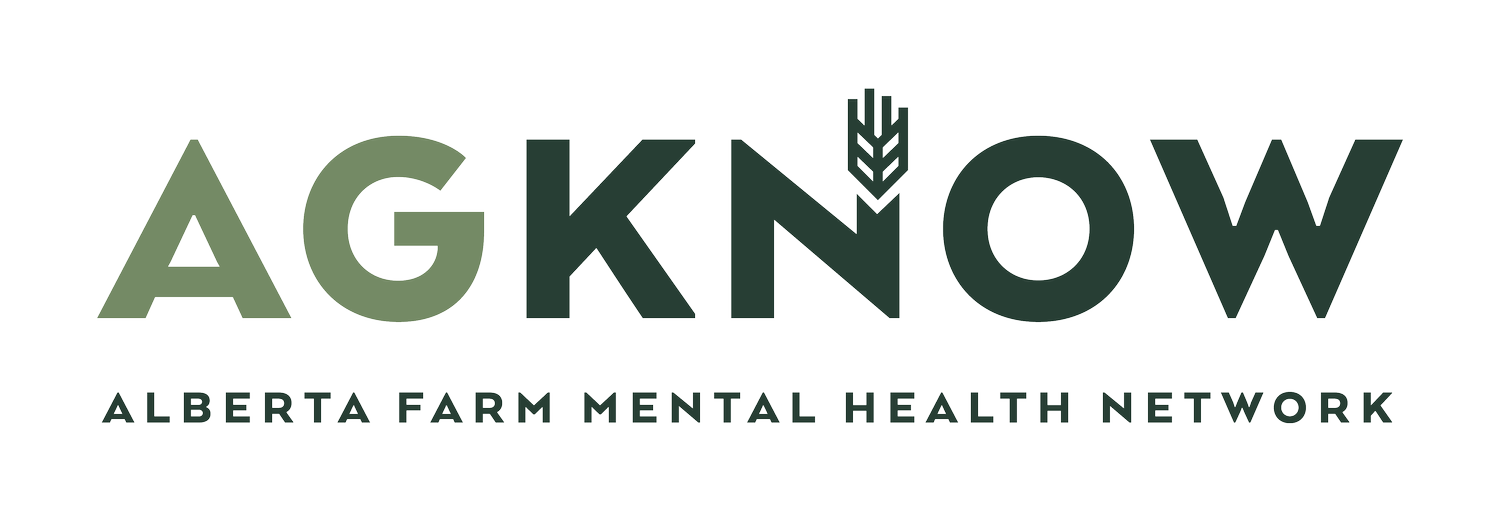Introducing AgKnow
As you may know, in May of 2022, the Alberta Farm Mental Health Network met with Minister Horner and presented their whitepaper outlining findings and recommendations for a made-in-Alberta approach to farm mental health.
Well, we’ve got good news! The minister was pleased to agree to our funding request, and a grant agreement has been signed earlier this month.
Along with the whitepaper, we presented the minister with a proposal to jumpstart research that will clarify the issues and inform the creation of evidence-based approaches for Alberta farmers.
As of late, Canadian research on farm mental health has been in its infancy and until now has been coming from the University of Guelph largely associated with the School of Veterinary Medicine.
Our research partnership in collaboration with Dr. Rebecca Purc-Stephenson and the University of Alberta will be focused on issues and service delivery models relevant to western Canadian agriculture.
One of our very first priorities was to develop a website portal to help destigmatize farm mental health and provide resources to help expand Alberta’s capacity for helping farmers and their families.
One way we’ve decided to approach this is by rebranding ourselves as AgKnow, with HUGE help of our friends at Freshly Pressed, which we will believe will help eliminate any barriers to communication for the farming community.
Our website is now live, and over the next few months, we will be developing Canadian-specific research, building evidence-based resources for farmers and practitioners, and continuing to grow our referral list of mental health practitioners with farm backgrounds and experience.
Livestock Depopulation
This research theme will create awareness and resources for Livestock Depopulation, which many farmers in Alberta are struggling with right now.
If you aren’t familiar with the term, depopulation refers to the complete loss of animals on the farm or in a barn due to extreme weather events or to prevent the spread of endemic diseases like Avian Influenza and Chronic Wasting Disease.
We’re rolling out our research program in the coming months, and we have decided to focus on three main themes we feel are some of the key stressors farmers in Alberta are facing right now.
The Province and Federal governments work together on emergency response plans to handle these types of events and have identified that there is a significant mental strain on both the farmers who face the loss and the regulators and veterinarians who carry out the orders. Currently, there are more federally mandated depopulation orders occurring in western Canada than in the rest of Canada.
Working with short-term funding from the province, our research with the University of Alberta will focus on studying the impacts of depopulation on the people involved to provide insight and perhaps recommendations on improving the situation for everyone involved.
Farm Transition
Farm transition, or Succession Planning is an ongoing concern for Alberta where the average age of farmers continues to rise, and yet the number of farms that have gone through transition planning with their family remains at 8.4% according to Stats Canada.
Advisors that are working with farm families to do the hard work of pulling together a plan are finding navigating the personal relationships between family members a huge obstacle. We’re working with our research team to shed some light on some of these barriers and explore what factors can ease the transition.
In the meantime, we are actively building a referral list of mental health professionals with farm backgrounds that may be of assistance when navigating those tricky family relationships. The goal is to develop referrals who have farm backgrounds or knowledge.
Over time, the research and learnings on farm transition for Western Canadian farm culture will be made available through the Network, with the hope that our resources can help farm transition specialists who are looking for support for their clients.
Farm Family Resiliency
The research is clear, farming is a high stress occupation and the impact of that stress touches every family member. Adapting to a world where farmers make up such a small part of the population, almost nothing is designed to meet their needs or specific challenges.
It can feel like everything has to be modified or adapted to make it work for the farm, and that includes mental health strategies like stress management and self care.
Knowing how to manage stress and include self care into your everyday life is key to any successful farming operation, and who better to learn from than other farmers?
The Network is committed to exploring the ideas and strategies that farmers use now that make Alberta’s farmers so successful. With this in mind, we focus is on peer to peer support and finding evidence based strategies that work for farmers here.
Our research with U of A will complement this theme by exploring what therapeutic approaches work best for farm clients and what recommendations can be given to healthcare providers to improve services for farmers.
We’re only getting started and will continue to grow as research is conducted and resources are developed. We plan to continue to engage with farmers, researchers, and professionals to help build a collaborative approach to farm mental health in Alberta.
As always, we will continue working towards our mission of promoting mental health and resilience among farmers and farm families by providing evidence-based resources around key stressors that farmers are facing now so that they can lead fulfilling and productive lives.
We’re sure you have many questions for us, and with that in mind, we’re hosting a virtual kick-off event to introduce ourselves, answer any questions you may have, and give you an official invitation to join our Network. Click here to register!
We’d also love to invite you to explore the website, so you can see all of the incredible things we’re working towards in the coming months.
The Network would like to give a special thank you to Minister Horner’s continued support in helping us develop agriculture-specific mental health resources.




